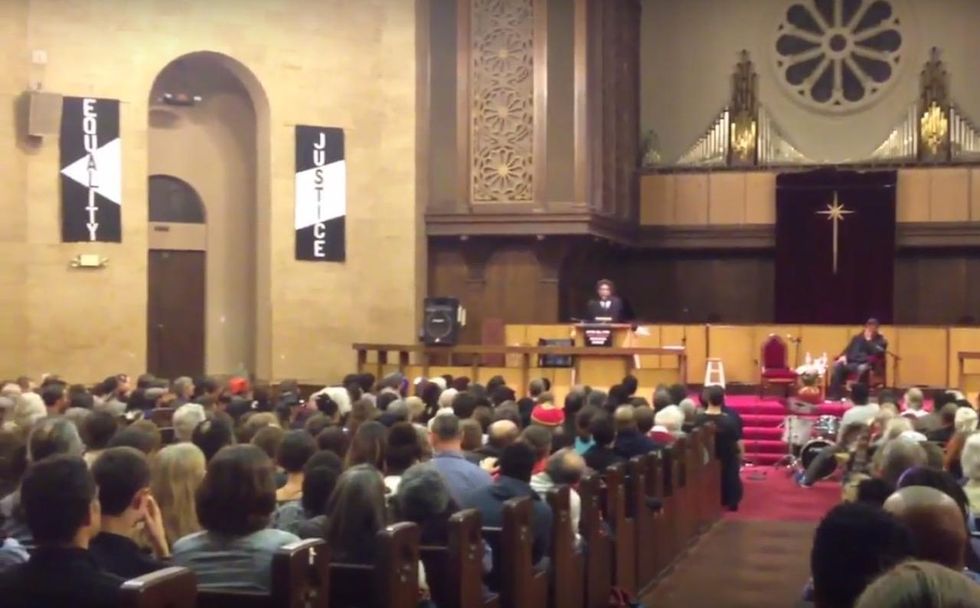
The First Congregational Church of Oakland (California) is one of a small number of churches that are determined to not call police for help anymore, even if violent crimes are in progress. (Image source: YouTube screenshot)

A small group of churches have come together for a different kind of mission.
They have determined they won't call police anymore. Not for homeless people who refuse to leave their sanctuaries, not for graffiti tagged on their buildings — and not even for instances of violent crime, the Washington Post reported.
Their reason? Police have treated people of color badly, and the churches want nothing to do with law enforcement and are set on completely abandoning police, the paper said.
The churches' term for their radical move is “divesting” from cops, the Post reported.
Nichola Torbet, a volunteer leader at First Congregational Church of Oakland (California) — one of the churches taking on this mission — told the paper that American law enforcement was "created ... to police black and brown bodies."
More from the Post:
The project of divesting is organized by Showing Up for Racial Justice (SURJ), a nationwide organization that tries to get white Americans working on behalf of racial justice. The four Unitarian and Protestant churches that have joined so far include three in the Bay Area and one in Iowa City. The Northern California Nevada Conference of the United Church of Christ has signed on to recruit from among its member churches, and the Bay Area churches are talking to more congregations in their area, from denominations including the Disciples of Christ and the Presbyterian Church (USA).
“It’s a challenging ask,” the Rev. Anne Dunlap, a UCC minister who leads SURJ’s outreach to faith communities, told the paper. “It’s a big ask to invite us, as white folks, to think differently about what safety means. Who do we rely on? What is safe? For whom? Should our safety be predicated on violence for other communities? And if not, what do we do if we’re confronted with a situation, because we are, as congregations? . . . How do we handle it if there’s a burglary? How do we handle it if there’s a situation of violence or abuse in the congregation?”
The churches in question are training members in alternate responses to danger, the Post reported.
Torbett told the paper that First Congregational leaders have invited experts from nonprofits to train church members to de-escalate mental health crises and in self-defense if violence breaks out on church property.
“Our goal is to never call the police,” she added to the Post, which noted that church members decided no one will be armed with weapons at church.
SURJ leaders noted to the paper that they aren't asking churchgoers to not call police for help outside of their time at church — but hope some will choose to go that extra mile.
Sarah Pritchard — a co-pastor at Agape Fellowship in Oakland, which also is part of no-calling-cops movement — told the Post she agrees with that sentiment. She also characterized her stance on police — as well as prisons — as “abolitionist.”
Dunlap told the paper that the endgame is taking down the police "system."
“You’re talking about state violence against communities. You have to speak up and take a stand about that. There’s not a nice way to just play in the middle,” she added to the Post. “There’s not a way to reform our way out of police violence but to dismantle policing as a system.”
The Post reported that many churches the SURJ approached weren't down with the idea.
“I had some hard conversations with pastors and members,” Dunlap told the paper. “These were progressive congregations that had participated in our work in the past – hung Black Lives Matter banners and had them vandalized. They said, ‘We appreciate our relationship with the police. We don’t want to put that at risk.'”
Chuck Wexler — executive director of the Police Executive Research Forum, which conducts studies on improving policing — told the Post that churches indeed should take on certain tasks alone, such as aiding someone who's drunk or sick.
But he added to the paper that churches would be foolish to attempt to intervene without police in the face of violence, especially if a gun is involved.
“I understand where these folks may be coming from," Wexler told the Post. "They’re saying we have issues. But if you have issues, you shouldn’t cut yourself off from such an important institution in the community. Communities only have one police force. If they’re not doing what you want them to do, you should be engaged with them. It’s disappointing to hear when a community or religious organization decides they’re not going to engage with the police anymore. Police need the church. They need an active clergy. They rely on them.”
Dunlap told the paper she doesn't want churches calling police even when there's violence because she doesn't trust the criminal justice system to do what's right.
“In the case of interpersonal violence, for the survivors as well as the perpetrators, we want to look at transformative justice,” she added to the Post. “Would a punitive police and legal system actually bring us the desired outcome for everyone involved? What are our actual values? What do our traditions teach us about redemption?”
Here's a clip of a Wednesday news conference in front of the First Congregational Church of Oakland on its decision to divest from police: